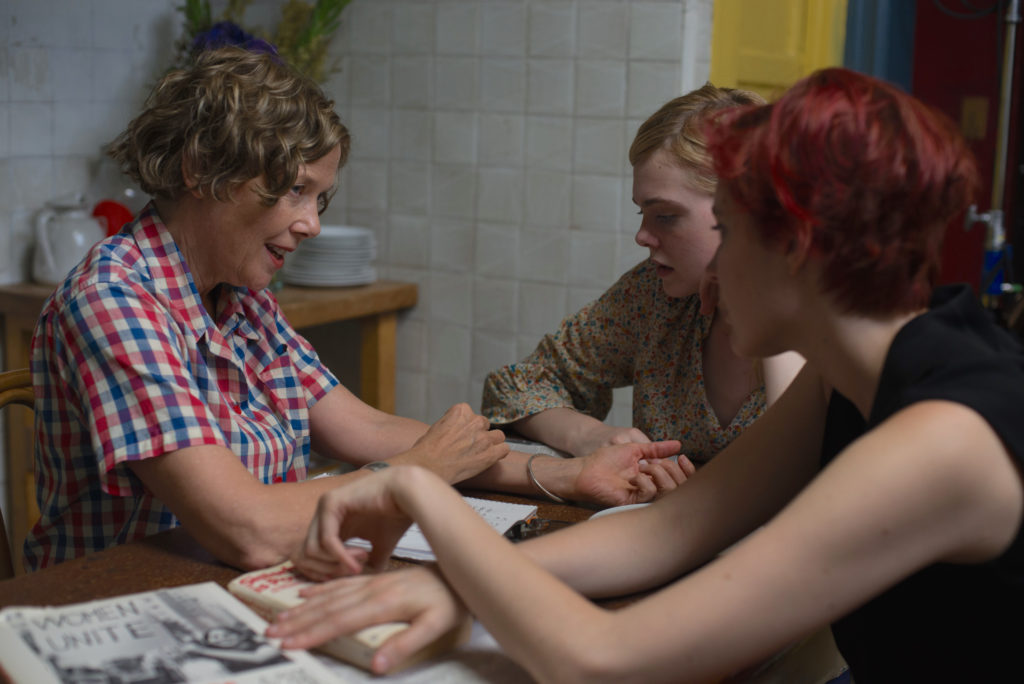
Annette Bening, Elle Fanning and Greta Gerwig exchange insights around the kitchen table.
It is possible that four generations and millions of 20th century women marched in hundreds of locations around the world this past weekend. It was probably not an accident that the new film, 20th Century Women was released just a few days earlier, undoubtedly in anticipation of the election of our first woman president. The marches demonstrated there is more that unites us than divides us, and that message is also woven through writer/director Mike Mills’s new film.
In 20th Century Women, Mills portrays three generations of women, composites of women he has known, surviving and evolving through seismic shifts. The past century encompassed more scientific and sociological change than the entirety of human history. Even in my own lifetime, color TV, computers, cell phones, fax machines, Internet, youtube, digital cameras, Netflix, wine in a box, tampons, pantyhose and so much more have required constant adaptation and adjustment.
Dorothea Field (b. 1924), played by Annette Bening, was based on Mills’ strong-willed mother. Appearing initially disheveled, overwhelmed, and afraid for her son, she is emotionally stuck and preparing for Armageddon with the advent of Y2K. Dorothea trained as a WWII fighter pilot but never flew, then married because that’s what was expected of women. At 40, she gave birth to a son and later divorced. Nothing turned out the way she had planned. Divorce and single parenting increased dramatically in the 20th century, leaving kids being shuttled from one household to another. In the film, they get sent to therapy sessions to talk about their parents.
The year is 1979. Dorothea is making ends meet, taking boarders into her rambling Santa Barbara home and driving a broken down car, which bursts into flames for no apparent reason. (I had a Volkswagen that caught on fire, too.) She offers her sexy, bohemian boarder William (Billy Crudup) two months’ rent to find her another car – done. (I lived in a communal house like hers in Sebastopol, Calif., after breaking up with my boyfriend.) Oddly, the character William was a hippie in Sebastopol, too. He’d learned to meditate, but couldn’t resist the ladies nor they him.
The complex story is a jumble of heartache and hope. Dorothea wonders how to raise her son Jamie alone, enlisting the help of her tenant Abbie Porter (b. 1955), played by Greta Gerwig, and Jamie’s best friend Julie Hamlin (b. 1962), played by Elle Fanning. Fifteen-year-old Jamie is given a copy of Our Body Ourselves, the bestselling guide to women’s health and sexuality, plunging him into feminist rhetoric. Abbie takes him to a nightclub and shows him how to seduce older women.
Jamie’s growing up, trying to help his mom, and asks why she is “fine being sad and alone.” She has come to terms with that part of life not working out. On the one hand, Dorothea wants to protect him and, on the other, exposes him to everything so he can learn. Jamie plays the “high voltage, high stakes” choking game with friends, ending up in the emergency room. He skateboards downhill on the wrong side of a winding road and disappears up the coast for a getaway with Julie.
Jamie is in love with Julie who only has sex with boys she doesn’t like. There are other reasons, she explains.
“Having your heart broken is a great way to learn about the world,” Dorothea tells Jamie, congratulating him for falling for such a complicated girl.
Abbie comes on to William. She is terrified of cervical cancer caused by her mother having taken the drug DES to prevent miscarriage. William makes a pass at Dorothea because every woman wants him. They have a brief flirtation. None of these liaisons work out.
Dorothea’s happiness is elusive. “Wondering if you’re happy is just a great shortcut to being depressed,” she tells Jamie. Her best memory of her ex was when he would check the stock report with his left hand while rubbing her back with his right.
The film is a lot to take in. Not easily understood nor summarized, but it seems real. Life is confusing, frustrating and unpredictable at every age. On this weekend when millions of women turned out to march in unison for common ideals, this movie is a good opportunity to learn more and laugh about the experiences we share.
 NOLAbeings
Multimedia artist Claire Bangser created NOLAbeings as a portrait-based story project that marries...
NOLAbeings
Multimedia artist Claire Bangser created NOLAbeings as a portrait-based story project that marries...
 Data corner: Adobe Suite (create a PDF, social media graphic, presentation, edit a photo and video
Data corner is where you go to work with analytics and top tech skills. It takes on everything from PERL and SQL to Canva and Sprout Social.
Data corner: Adobe Suite (create a PDF, social media graphic, presentation, edit a photo and video
Data corner is where you go to work with analytics and top tech skills. It takes on everything from PERL and SQL to Canva and Sprout Social.
